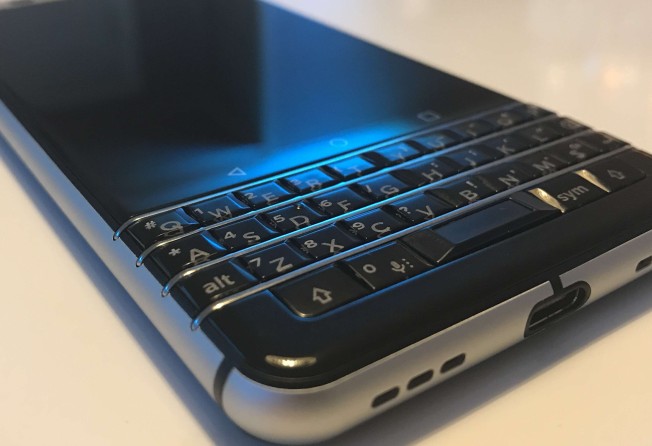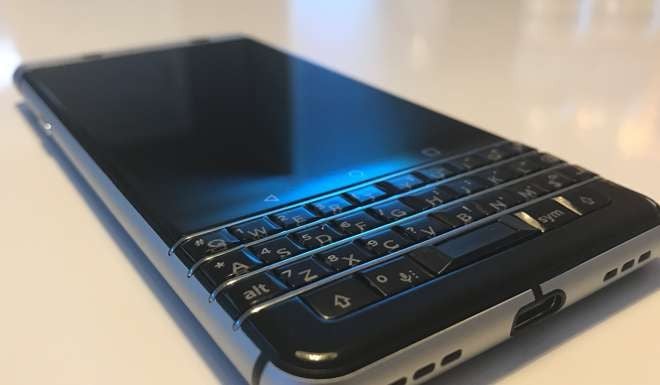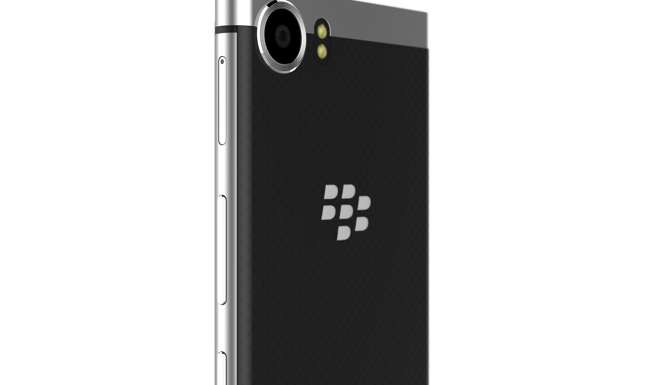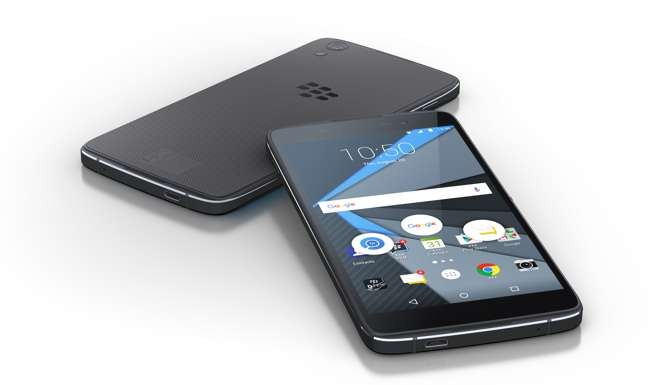Why a BlackBerry needs a keyboard - head of China’s TCL talks up new smartphone at CES 2017 tech show
With a QWERTY keyboard that maker TCL’s Nicolas Zibell says is ‘tactile and with some new innovations’, and a leather back, latest BlackBerry Android offering certainly stands out from its metallic-slab smartphone rivals

Real keyboards don’t belong on smartphones. Smartphones should be metallic, as slippery as a soap bar and, above all, they should all look identical. If that’s the case, then the next BlackBerry phone breaks a lot of the rules.
“A keyboard is essential to a BlackBerry,” says Nicolas Zibell, chief executive of China-based TCL Communication at the Consumer Electronics Show (CES) 2017 in Las Vegas during a sneak preview of his company’s upcoming BlackBerry-branded phone.
Possibly called the Press, the Mercury or the DTEK70 if the internet is to be believed (though destined to be unnamed until its official launch in late February), the keyboard and soft leather back of the device give it an unusual look. What it certainly doesn’t look like is a black piece of glass, which immediately makes it a one of a kind in the copycat smartphone market.
“Part of our strategy to revive the BlackBerry brand is to come back with a keyboard, but one that has meaning,” says Zibell, confirming that the TCL-made device will go on sale early in the second quarter of 2017 for a “good value” price in markets including Hong Kong, Europe and North America.
Those who hate typing on phone touch screens – and there are plenty about – will love the old-fashioned hardware on this BlackBerry.

“We’ve made it tactile and with some new innovations,” says Zibell of the keyboard, which combines hard but touch-sensitive QWERTY keys with predictive typing functionality.
However, there’s nothing retro about this keyboard. Its space bar on the keyboard also works as a basic trackpad, allowing the user to scroll just by moving their fingers across it, which will be familiar to users of the BlackBerry Passport. It also allows page navigation just by dragging a finger across it.
Will it be enough to boost the BlackBerry brand? Futuresource Consulting estimates BlackBerry’s share of the global market in 2016 was 0.2 per cent, and that it shipped a total of just 2.5 million units. TCL was estimated to hold 2.7 per cent of the global market in 2016, shipping 44 million units. While TCL will now take care of the manufacturing, having licensed the brand name for the long term, the original BlackBerry company will concentrate on making future devices’ software, including the mobile security the brand is known for.

Despite the relatively small number of people still buying BlackBerry devices, Zibell is bullish about the brand’s future. “There is a percentage of the population that is very much attached to having a physical keyboard, and many of them hang on to a BlackBerry phone longer than most people hang on to their phones,” he says. “So we wanted to create a modern, reinvented keyboard experience.”
Physically, that’s not been easy. “The challenge is to have a full-size keyboard and at the same time be fully Android-compatible, but we believe we’ve done that with this device,” Zibell explains.
The problem is the display size and the ratios needed to display Android apps; the wider the device, the less likely it can correctly show apps. The device I was shown had a 4.5-inch screen, though as much as a third of the device is taken up by that keyboard. It may not be the ideal phone for watching videos.
While the keyboard in this particular BlackBerry is the reason to buy it, it’s not necessarily a fixed feature of future BlackBerry devices. Neither of the two most recent BlackBerry phones, which TCL also manufactured – the DTEK50 and DTEK60 – have keyboards.

“We’ll see more of those,” says Zibell, “but this one is very different because of the way you interact with the keyboard.”
The new BlackBerry phone runs on the latest Android 7.0 Nougat operating system, and physically it’s reminiscent of the BlackBerry Classic and Priv.
As well as keyboards, BlackBerry phones have always been known for their security features, and these are retained. Hidden in the keyboard is a fingerprint sensor under the space bar, housed beneath a small but noticeable depression.
“BlackBerry claims to have some of the most secure devices sold on the market, operating on its custom Android platform with additional security applications or BlackBerry’s dedicated OS,” says James Manning Smith, information analyst at Futuresource Consulting, adding that the brand’s reputation for security is justified by its use of built-in encryption and the protection BlackBerry’s servers offer handset users.
BlackBerry’s reputation for highly secure encryption has made corporate buyers the primary market for its phones, and this handset will doubtless appeal to them.
“In the past, BlackBerry has been a leading supplier of corporate handsets due to security concerns with other operating systems and the BlackBerry OS’ ease of administration for large corporations, says Manning, “but there is no longer a large preference for the BlackBerry OS by businesses.”
People ... had to sacrifice web browsing experience and apps, and what we’re bringing back is a ‘no compromise’ approach
Zibell agrees that there has been some damage to the brand in recent years. “One of the reasons that BlackBerry lost some of its appeal was that people had to make a compromise between good e-mail and security,” he says. “But they had to sacrifice web browsing experience and apps, and what we’re bringing back is a ‘no compromise’ approach.”
However, the elephant in the room is not security or attractiveness to business, but the partnership between two hardware and software companies in the smartphone business. Microsoft’s US$7 billion acquisition of Nokia’s Lumia brand in 2013 failed. Microsoft and Nokia failed to make long-term gains,” says Manning, “but this licensing deal may create greater cost efficiency for both TCL and BlackBerry … BlackBerry could expand its reach via TCL’s manufacturing platform, while the licensing agreement may benefit both businesses internally.”
The market will decide that, but Zibell thinks there are fundamental differences between the two deals.
“Microsoft imposed its Windows Phone OS, which was small-scale in terms of users, app and ecosystem, onto a Nokia brand that had been successful only in feature-phone space, and not in the smartphone market,” he says. “Here’s it’s very different because we are full Android-based, we don’t make compromises on the apps, and we are bringing a unique offer within the Android ecosystem ,” he says. “We are bringing security solutions and specific hardware innovations.”
The new BlackBerry smartphone’s name and final details will be officially disclosed at the Mobile World Congress 2017 in Barcelona next month, and it will go on sale shortly afterwards.